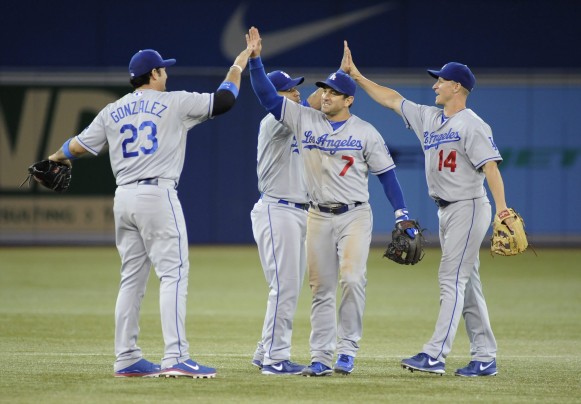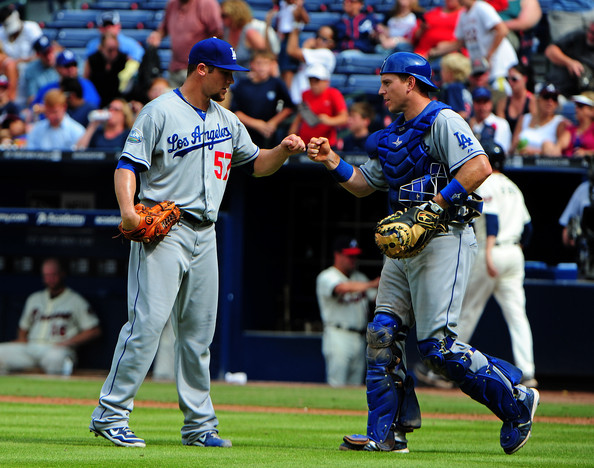
Matt Kemp swings and misses at Brad Ziegler’s final pitch in the Dodgers’ 2-1 loss to the Arizona Diamondbacks on Monday. (Associated Press photo)
It did.
The first out, you may recall, was recorded at third base. Juan Uribe was ordered to lay down a sacrifice bunt attempt and pushed the ball just a little too hard, enough to result in lead runner Michael Young getting gunned down by the Diamondbacks’ infield while a frustrated Uribe touched first base safely.
Dodgers manager Don “Mattingly … voluntarily hobbled the Dodgers by ordering hot hand Juan Uribe to sacrifice with runners on first and second and nobody out,” wrote Jay Jaffe at SI.com.
“Makes perfect sense if you’re into age-old rationales, and even if you’re not, it just might have worked if Uribe WOULD HAVE ACTUALLY GOTTEN THE JOB DONE,” wrote Tony Jackson (among his many less-than-flattering odes to the sacrifice bunt).
But if you read anything this morning about the bunt and its history, and why there’s such a loud furor over Mattingly’s decision, head over to BuzzFeed (and just try to resist the allure of “18 Animals Who Got the Last Laugh”). The age-old anti-bunting argument, presented by author Erik Malinowski, can be summed up in two points:
1, Baseball history — we’re talking a huge sample size here — shows that trading an out for 90 feet decreases a team’s odds of scoring a run.
2, Executing the bunt strategy usually requires a fast runner, a skilled bunter and another hit after the bunt (a sacrifice fly or an opponent’s error would have worked in this particular case, too). The Dodgers had none of these in the ninth inning Monday.
The argument is about as old as me — born in the early 1980s — so to convince bunting advocates against their position in 2013 reeks of dragging tobacco executives before the House of Representatives in 1994. I don’t have the power to levy a bunting tax, though I do have the power to point out its illogic. That doesn’t seem to be enough.
So what would convince Mattingly and the Dodgers to stop bunting at this point?
Malinowski hints — and recent history suggests — that it might simply require some more progressive thinking in the Dodgers’ front office, and some people who can present the data in a convincing manner. A little desperation would help, too.
Take the 2012 Pittsburgh Pirates, for example. They had an old-school manager (Clint Hurdle) and a fairly desperate circumstance. Their payroll was maxed out. They were competing in a tough division. And they were giving away outs — not by bunting, but in the way they played defense. So with the help of a few progressive front-office officials, the Pirates turned a little conventional baseball wisdom on its head and changed the way they played defense. It’s been an important factor in their success this season.
If the Pirates can do it, maybe the Dodgers can turn some (quasi-conventional) baseball wisdom on its head and change the way they advance runners. It will take desperation and progressive thinking.
Some bullet points for a Roberto Clemente Day:
Continue reading “Daily Distractions: Persisting in the argument against Juan Uribe’s evil ninth-inning bunt.” »



